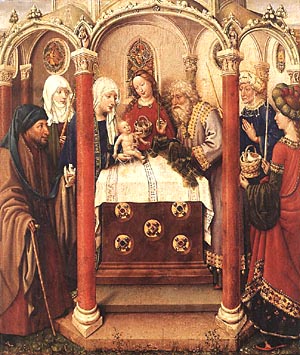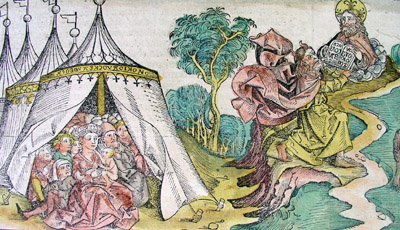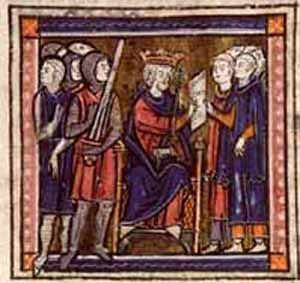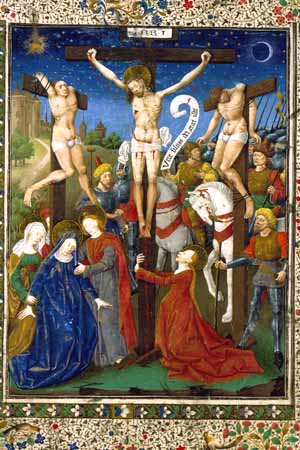 |
Feasts of Our Lord
Circumcision of Our Lord – January 1
Prof. Plinio Corrêa de Oliveira
You are all familiar with what entails the ceremony of circumcision that was imposed by the Old Law on every male of the race of Israel. Our Lord Jesus Christ was not obliged to follow that law, because being the true God, He could dispense Himself from the law He had made. But He decided to subject Himself to that law for the highest reasons.

The Circumcision of Our Lord - Jacques Daret, c. 1404 |
He wanted to show His love for that law as a reflection of His love for all laws, for the whole order He established in the universe, and for the authorities established by Him to maintain it. Therefore, the Man-God made an act of humility and subjected Himself to the law like any other man.
The circumcision was a pre-figure of Baptism and symbolized that the male child was purified and united to God. On the eighth day following His birth, the Divine Child was presented in the Temple and circumcised according to the Law existing in Israel since the time of Abraham. On this occasion, He was given the name Jesus.
With this example, there is a lesson for us: we should love, observe, and follow just and reasonable laws that are in accordance with Divine Law and Natural Law. It is, in effect, an example instructing us to love the Law of God.
There are three elements to consider when speaking of the Law of God.
First, there are the Ten Commandments God revealed to Moses. Those Commandments were a codification of the principles of Natural Law. Human nature in itself stipulates these ways of acting. Those rules were inscribed in the very nature of all of mankind. But as consequence of original sin and the resultant accumulation of hereditary sins, human intelligence lost its compass that pointed out what was good and evil. For this reason God revealed the Decalogue to Moses as a summary of Natural Law so that mankind could better follow the right path.

Moses receives the Ten Commandments on Mount Sinai |
We must love the Commandments because they are a summary of the natural order. They reflect the wise order God put in the universe and are, therefore, the proper expression of His wisdom and holiness. For us to have an appropriate idea of the Eternal Wisdom of God and His Infinite Holiness, we should analyze and admire the ensemble of the universe synthesized in the Commandments He gave us.
Second, by revealing the law, God raised those precepts to the plane of Divine Law. This is the second element, the supernatural character introduced in that synthesis of Natural Law. We must love these Commandments because they were revealed by God. They are orders given by God. As long as we must love God above everything, we must follow His will and, therefore, obey the Commandments.
Third, God also gave Moses detailed laws to govern the worship and establish the State of Israel. These, as well, should be studied and admired. In this legislation there were many items that were not demands of Natural Law, but were positive religious laws instituted by God.
In the New Covenant Our Lord Jesus Christ added various moral points to the Law, but He did not touch the Ten Commandments, which will remain the same until the end of time. Our Lord came to complete the Law, not to revoke the Old Law.

Catholics must obey the civil law that is in accordance with Revelation. Above, an Emperor upholds the Justinian Code |
Our Lord was the perfect model of obedience not only to the Ten Commandments but also to all the detailed Mosaic laws instituted by God. His obedience was an expression of His love for the Eternal Father.
The Gospel reports numerous times Our Lord directed Himself to the Father in expressions of great love, union and obedience right up to that moment in the Garden of Olives when He said: “Father, if Thou wilt, remove this chalice from Me: but yet not My will, but Thine be done." His last words were these: “Father, into Thy hands I commend My Spirit.” This was His last communication with the Father: an act of adoration, submission, and obedience. This was what Our Lord Jesus Christ taught us from the beginning of his life – at the circumcision – until the end from the height of the Cross.
In the circumcision He shed His first drop of blood for humankind. Many theologians sustain that with that simple drop of blood, the Redemption of mankind could have been accomplished. But by the mysterious designs of Divine Providence, a great outpouring of blood, His death and even His last drop of blood that issued forth from the wound inflicted by Longinus’ spear were necessary for our Redemption. He accepted all this to accomplish the will of the Eternal Father.
We see how the spirit of Our Lord is the opposite of the spirit of the Revolution, which is a spirit adverse to laws, without any love for the authority that legislates. It considers laws as shackles, and obedience as coercion. According to this revolutionary spirit, man should revolt against the laws and follow only his own reason and instincts.

Our Lord was a perfect model of obedience to the Father's will right to the Crucifixion
Missel d'Autun, Lyon, 1450-1500 |
On the contrary, Our Lord gave us a profound counter-revolutionary teaching: His unremitting obedience to God, to Eternal Law, Divine Law, positive law and all the customs established by Tradition in the Old Covenant and, by anticipation, in the Catholic Church. This legacy should be loved in its letter and spirit. We should also love the civil laws insofar as they are a reflection or an application of the principles contained in Revelation, that is, in Scriptures and Tradition.
One could ask me: Is this obedience to Church laws valid in the sad days in which we live, in the desolate situation into which the Catholic Church has fallen?
I answer: Yes, more than ever. But what laws should be obeyed? We must follow those laws which are in accordance with the perennial Magisterium and Tradition of the Church. These are the laws that have the same spirit of Our Lord.
That same love for God should induce us not to obey laws that are contrary to that spirit. For instance, the recently released ecumenical directive by the Vatican saying that Catholics can receive sacraments in Schismatic and heretic temples. A Catholic can neither love this law nor accept it as legitimate because it is intrinsically bad. The same love that leads us to be obedient to the Catholic Church also leads us to resist and not obey this bad law.
There are two forms of submission. One is to bend our heads as a sign that we renounce our wills to follow God’s will alone. Another is to raise our heads to defend the will of God against those who want to impose something contrary to it.


  | | Prof. Plinio Corrêa de Oliveira | |
The Saint of the Day features highlights from the lives of saints based on comments made by the late Prof. Plinio Corrêa de Oliveira. Following the example of St. John Bosco who used to make similar talks for the boys of his College, each evening it was Prof. Plinio’s custom to make a short commentary on the lives of the next day’s saint in a meeting for youth in order to encourage them in the practice of virtue and love for the Catholic Church. TIA thought that its readers could profit from these valuable commentaries.
The texts of both the biographical data and the comments come from personal notes taken by Atila S. Guimarães from 1964 to 1995. Given the fact that the source is a personal notebook, it is possible that at times the biographic notes transcribed here will not rigorously follow the original text read by Prof. Plinio. The commentaries have also been adapted and translated for TIA’s site.
|
Saint of the Day | Home | Books | CDs | Search | Contact Us | Donate

© 2002- Tradition in Action, Inc. All Rights Reserved
|
 |
|